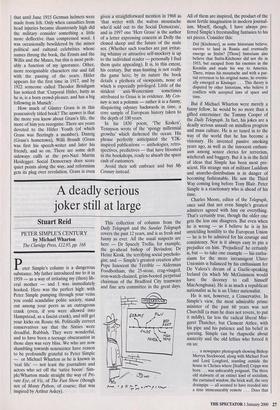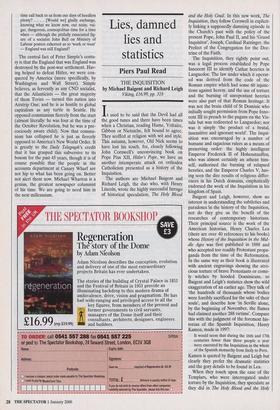A deadly serious joker still at large
Stuart Reid
PETER SIMPLE'S CENTURY by Michael Wharton The Claridge Press, £12.95, pp. 168 Peter Simple's column is a dangerous substance. My father introduced me to it in 1959 — as a way of irritating my (then) lib- eral mother — and I was immediately hooked. Here was the perfect high: with Peter Simple pumping through your veins you could scandalise polite society, stand out among your peers as an outrageous crank (even, if you were allowed into Hampstead, as a fascist crank), and still get your kicks on Route 66. Politically correct conservatives say that the Sixties were dreadful. Rubbish. They were wonderful, and to have been a teenage obscurantist in those days was very bliss. We who are now shambling towards senescence have reason to be profoundly grateful to Peter Simple — or Michael Wharton as he is known in `real life' — not least the journalists and actors who set off the 'satire boom'. Sim- ple/Wharton made straight the way of Pri- vate Eye, of Viz, of The Fast Show (though not of Monty Python, of course; that was inspired by Arthur Askey). This collection of columns from the Daily Telegraph and the Sunday Telegraph covers the past 12 years, and is as fresh and funny as ever. All the usual suspects are here — Dr Spacely Trellis, for example, the go-ahead bishop of Bevindon; Dr Heinz Kiosk, the terrifying social psycholo- gist; and — Simple's greatest creation after Pope Innocent the Terrible — Alderman Foodbotham, the 25-stone, crag-visaged, iron-watch-chained, grim-booted perpetual chairman of the Bradford City tramways and fine arts committee in the great days. All of them are inspired, the product of the most fertile imagination in modern journal- ism. Myself, though, I have always pre- ferred Simple's freestanding fantasies to his set pieces. Consider this:
Did [Kitchener], as some historians believe, survive to land in Russia and eventually emerge as Stalin? [Those] historians also believe that Stalin-Kitchener did not die in 1953, but escaped from his enemies in the Kremlin and made his way to America. There, minus his moustache and with a par- tial reversion to his original name, he eventu- ally emerged as Kissinger . . . This theory is disputed by other historians, who believe it conflicts with accepted laws of space and time.
But if Michael Wharton were merely a funny fellow, he would be no more than a gifted entertainer: the Tommy Cooper of the Daily Telegraph. In fact, his jokes are a deadly serious assault on mindless progress and mass culture. He is so tuned in to the way of the world that he has become a visionary. He invented passive smoking years ago, as well as the innocent enthusi- asm among senior clerics for terrorism, witchcraft and buggery. But it is in the field of ideas that Simple has been most pre- scient. His strange mix of militant Luddism and anarcho-distributism is in danger of becoming fashionable. He saw the Third Way coming long before Tony Blair. Peter Simple is a reactionary who is ahead of his time.
Charles Moore, editor of the Telegraph, once said that not even Simple's greatest admirers agreed with him on everything. That's certainly true, though the older one gets the less one disagrees. But even when he is wrong — as I believe he is in his unyielding hostility to the European Union — he is to be admired for his courage and consistency. Nor is it always easy to pin a prejudice on him. 'Prejudiced' he certainly is, but — to take one example — his enthu- siasm for the more intransigent Ulster Unionists is balanced by his enthusiasm for De Valera's dream of a Gaelic-speaking Ireland (in which Mr McGuinness would have the decency to call himself MacAonghusa). He is as much a republican nationalist as he is an Ulster nationalist.
He is not, however, a Conservative. In Simple's view, the most admirable prime minister of the past 60 years was not Churchill (a man he does not revere, to put it mildly), far less the radical liberal Mar- garet Thatcher, but Clement Attlee, with his pipe and his patience and his belief in queuing. Simple can be rhapsodic about austerity and the old lefties who forced it on us: ... a newspaper photograph showing Bishop Mervyn Stockwood, along with Michael Foot and Lord Longford, standing outside the house in Chelsea where [Stafford] Cripps was born . . . was unbearably poignant. The three old stalwarts of an extinct kind of socialism, the curtained window, the brick wall, the very drainpipe — all seemed to have receded into a time immeasurably remote „ Does that
time call back to us from our days of heedless plenty'? [Would we] gladly exchange, knowing what we know now, our noisy, vul- gar, dangerous, cosmopolitan time for a time when — although the pitifully emaciated fig- ure of a socialist John Bull on Ministry of Labour posters exhorted us to 'work or want' — England was still England?
The central fact of Peter Simple's centu- ry is that the England that was England was destroyed by the post-war settlement. Hav- ing helped to defeat Hitler, we were con- quered by America (more specifically, by Washington and Wall Street). Simple believes, as fervently as any CND socialist, that the Atlanticists — the great majority of them Tories — turned this nation into Airstrip One; and he is as hostile to global capitalism as any turtle in Seattle. He opposed communism fiercely from the start (almost literally: he was four at the time of the October Revolution, but he was a pre- cociously aware child). Now that commu- nism has collapsed he is just as fiercely opposed to America's New World Order. It is greatly to the Daily Telegraph's credit that it has grasped this subversive to its bosom for the past 45 years, though it is of course possible that the people in the accounts department at Canary Wharf are not hip to what has been going on. Better not alert them now. Michael Wharton is a genius, the greatest newspaper columnist of his time. We are going to need him in the next millennium.



















































 Previous page
Previous page